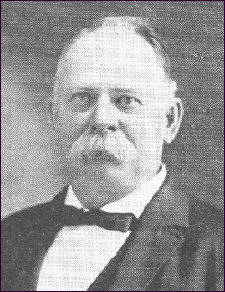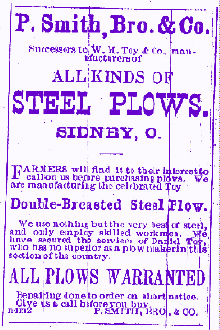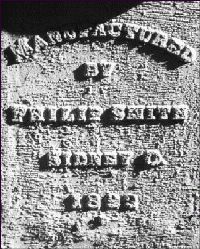EARLY INDUSTRIALIST HELPED
TRANSFORM SIDNEY |
| In 1859, just prior to the start of the Civil War, Sidney was a sleepy little
village. Small, family-sized businesses were the order of the day. All of that was about
to change with the arrival of Philip Smith. He was to become the first of a series of
great industrialists that would transform Sidney's character forever.
Born in Pennsylvania, Smith moved to Dayton as a youngster and learned the
molder's trade with the firm of Thompson, McGregor and Callahan. At the age of 21 he left
his family in Dayton and moved to Sidney. After working for a short time for the Haslup family, he started his own foundry business with a grand total of $25 in capital.. A short
time later his brother, Michael, moved to Sidney. Together, they formed a partnership
known as P. Smith & Bro.
In the early years, Smith took on whatever foundry work was available. In the first of
what was to be many business sidelines, he developed a spoke works, where Philip and
Michael manufactured wagon wheel spokes and other metal wagon parts.
Soon the Smith brothers began
casting bells in their small foundry. After some early success, disaster struck. A
devastating fire destroyed the foundry in the 1860's. With no insurance, the men struggled
to rebuild. In an article that appeared some years later, the editor of the Sidney
Journal recalled: "Undaunted by their severe loss and adversity, they again
girded on the armor to fight the battles of the world. The result shows what can be
accomplished by indomitable perseverance and untiring energy." |

Philip Smith
|
By 1870, the business was
casting sugar kettles and various sizes of bells for schools and farms that were sold
throughout the Midwest and western United States. A new foundry was erected.
Another early Sidney business was Toy Plow Works, established by Daniel
Toy, the inventor of the moldboard plow. Smith bought out that business in the early
1870's, and in a marketing move used frequently today, hired Dan Toy as a consultant, and
advertised in the newspaper that "We have secured the services of Daniel Toy, who
has no superior as a plow maker."
Despite a series of near business failures, by 1879, Philip Smith had
developed a steady business. The Sidney Journal in January of that year reported
that his factory was turning out up to 8,000 bells and 4,000 sugar kettles each year. As
one of the first Sidney manufacturers to establish trade outside Ohio, the Journal reported
that his goods were being shipped "to Indiana and the West."
It seemed that every time Smith met with success, a severe business recession or other
calamity forced him to move in a different direction. Frequently, this meant new products.
He commenced the building of steam engines, and installed a state of the art engine and
boiler in John Loughlin's School Furniture
Company in 1882.
Although his expanding business
occupied the majority of his time, Philip Smith did serve several terms on City Council
over the years, beginning in 1881. Shortly after that Anna, his wife of 23 years, died.
Smith, left to raise their ten children, remarried Mrs. Mary French of Champaign County on
Thanksgiving Day in 1885.

One of the great "what
if" stories in Sidney's history involved Smith. The Shelby County Democrat announced to the community on November 1, 1889 that Ben P. Wagner had invented and
patented a cash register, which would be manufactured by Philip Smith in Sidney.
Subsequently, it was learned that Wagner and a gentleman from New York had applied for and
obtained patents on the cash register at virtually the same time. A lawsuit was filed
concerning the patents which resulted in the business being developed in Dayton instead of
Sidney.
The mention of cast iron cookware leads immediately to a discussion of Wagner Manufacturing and its dominant role in that
industry. Wagner's use of "Sidney, Ohio" on the back of its cookware helped put
Sidney on the map. History tells us, however, that Philip Smith was there first.
Wagner was not formed until 1891. By
1886, Smith's foundry was manufacturing an assortment of cookware, then known as hollow
ware. In March of 1888, Smith expanded his business to meet increasing customer demand and
hired 20 additional men. He continued this segment of his business, manufacturing the
finest quality of polished hollow ware until 1897.
In perhaps the largest business deal
in Sidney's history up to that time, Smith sold this portion of his business to Wagner
Manufacturing. The Sidney Journal told the story in a headline in its October 22,
1897 edition: "Philip Smith sells out." The price tag was $35,000.
In 1907, Philip Smith incorporated
as the Philip Smith Manufacturing Company with the help of local financier L.M. Studevant. The company concentrated on the
production of grain handling and cleaning equipment, but also manufactured such varied
items as copper tub wringer washing machines and milling equipment.
1907 also saw the abrupt retirement
of Smith due to complications arising from his diabetes. He had been in the forefront of
Sidney co5mmerce for 48 years. An anonymous biographer of the time provided the following
observation about Philip Smith: Looking over his business career, with its many ups and
downs, pinched financially most of the time, requiring all his wits and his indomitable
energy to pull through, he reminds one of the man who rolled down a hill with arms around
a log and when he got to the bottom cheerfully remarked that the log did not get any the
best of him for he was on top half of the time.
After his retirement, Mr. and Mrs.
Smith traveled frequently. Under her influence, Smith became an active member of the
Baptist Church. At the time of his death in 1914, Smith was eulogized as the pioneer
industrialist of Sidney. The Sidney Daily News remembered him as a man "...who
met adversity with courage. No matter what his financial troubles were, he renewed the
battle with more courage, and won." According to his last wishes, a marching band
led the funeral procession to the cemetery.
One can still see remnants of
the Philip Smith legacy in use today, reminding us of his contribution to our heritage. He
manufactured fire escapes for many downtown buildings, including the Monumental Building.
His cast iron storefronts, like the one on the Piper
building on Main Avenue south of Courtview Center, still grace structures around the
courtsquare. Many of the manhole covers in our streets were cast at the Philip Smith
foundry. Some of Sidney's older residents will remember the cast iron hitching posts that
adorned the courtsquare for over 50 years. They were also made at the Smith foundry.
Smith's
children continued his legacy of public service. Pete Smith, one of his sons, built the Lenita, Sidney's last canal boat, with the
help of the men at the Bimel Buggy Company.
One grandchild of Smith remains. Ruth Grode of Sidney, remembered him. "All of the
family members were so proud of him. Grandfather represented the best Sidney had to
offer."

This plaque can be
seen on the north side of the Piper buildings, in the alley adjacent to the Courtview
Center.
Photo by Sherrie
Casad-Lodge.
[ Back to People Index ]

